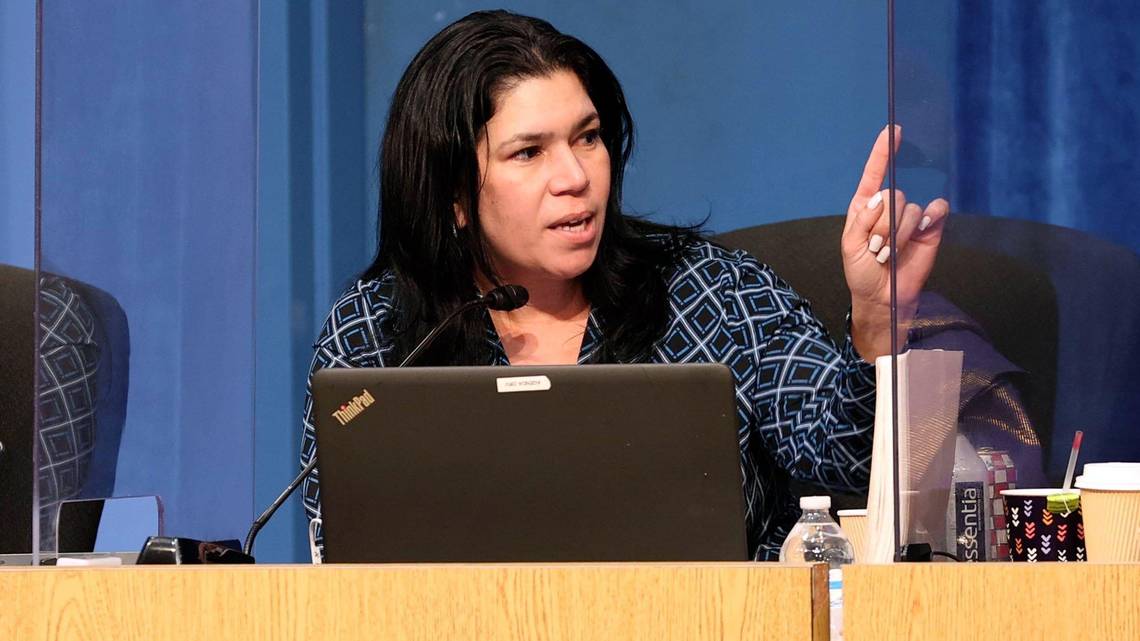Miami-Dade School Board may lose member to new law on Dec. 31. DeSantis would name a sub
Miami Herald | By Sommer Brugal | December 5, 2022
A law prohibiting elected officials from lobbying goes into effect at the end of the month and could result in one Miami-Dade County School Board member stepping down and Gov. Ron DeSantis appointing a replacement.
The Constitutional Prohibition Against Lobbying by a Public Officer implements a constitutional amendment voters approved in 2018 that restricts lobbying during their term in office and extends the period of time that certain elected officials can’t lobby after leaving office from two to six years. It goes into effect Dec. 31.
The prohibition, which goes into effect Dec. 31, applies to legislators, county commissioners, constitutional county officers and elected municipal officers. But it also applies to school superintendents and school board members, meaning Vice Chair Lubby Navarro, a registered lobbyist for the South Broward Hospital District, a public hospital, may be required to relinquish her seat on the board.
Navarro, the only registered lobbyist on the school board, did not respond to multiple requests for comment, so it remains unclear if or when she plans to step down. Still, for Jose Arrojo, executive director of the Miami-Dade Commission on Ethics and Public Trust, the “plain language of Article II, Section 8(f) of the Constitution is quite clear.” “
A school board member is prohibited during his or her term from lobbying at the federal, state and local level and for six years after, may not lobby his former agency, the school board,” he said in an email. Though he is authorized only to interpret county and various municipal ethics ordinances, he asserts the new law “may [also] have significant impact on local government officials.”
The next school board meeting is Dec. 14. On the agenda are proposed amendments to school board policies, such as the need to “conform with Article II, Section 8(f) of the Florida Constitution.”
BROAD IMPLICATIONS
The implementation is the latest installment of a 2018 law that proposed revisions to the Constitution relating to ethics in government.
The first implementation, which took effect Dec. 31, 2020, barred public officials and public employees from using their office to “disproportionately” benefit themselves, their spouse, children, employer or entities with which they have certain business interests.
The second round of implementations, which goes into effect later this month, includes two additional provisions.
The first is a six-year ban on lobbying after they leave office for legislators and statewide elected officials, and local elected officials who serve on boards or commissions. The second bars public officers from lobbying while in office to any political agency or governing body for anything related to policy, appropriations or procurement, such as contracts.
For Ron Book, a local attorney and lobbyist, the upcoming changes have the potential to affect a lot more governing bodies than the school board, though. That’s because “you don’t have to be registered as a lobbyist for [this law] to apply to you,” he asserted.
According to Book’s reading, city attorneys and city managers, for example, would also be affected.
Notably, Daniel Espino, who was appointed by DeSantis on the eve of the swearing-in ceremony, previously served as a Doral city attorney for five years and also served as the city attorney for North Miami Beach, Miami Springs and North Bay Village. It’s unclear if Espino would be affected by the law. He did not return a request for comment.
ANOTHER DESANTIS APPOINTEE
For the school board, the upcoming changes would prompt another shakeup less than six weeks after new members were sworn in and new leadership, which includes Navarro, was elected. (Navarro was elected vice chair in a 5-4 vote.)
On Nov. 22, Roberto Alonso and Monica Colucci, who were both endorsed by DeSantis in the August primaries, were sworn in, replacing longtime members Perla Tabares Hantman and Marta Pérez. The third newcomer, Espino, was sworn in to replace Christi Fraga, who served just two years of her four-year term before stepping down to run for Doral mayor.
Maria Teresa Rojas and Dorothy Bendross-Mindingall were also sworn in for the second and third times, respectively.
The implications of the law could also result in DeSantis having a second opportunity to appoint a new member to the board to serve the remaining two years of Navarro’s term. However, given the board’s newly secured conservative majority, a DeSantis appointee would likely have little impact on the political makeup of the board.
In recent months, Navarro, who was appointed to the school board by former Gov. Rick Scott in February 2015 and later elected in 2016 and 2020, has become increasingly more political, supporting a conservative agenda and becoming a loud proponent of parental rights.
In April, she came under fire for suggesting that “God and Jesus Christ” were the only god. More recently, she voted against a comprehensive sexual health textbook, rejected a motion to honor October as LGBTQ history month and claimed that parents were the district’s only customers.
The governor’s office and the Florida Department of Education did not respond to requests for comment.






